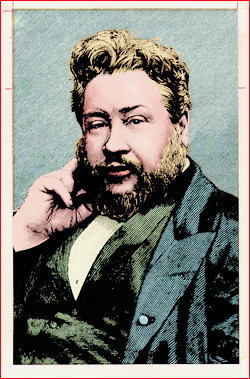posted by Phil Johnson
 The PyroManiacs devote some space each weekend to highlights from The Spurgeon Archive. The Following excerpt, chosen in honor of Reformation Day, is from "Reform," a sermon preached Sunday morning, 13 February 1859, at the Music Hall, Royal Surrey Gardens.
The PyroManiacs devote some space each weekend to highlights from The Spurgeon Archive. The Following excerpt, chosen in honor of Reformation Day, is from "Reform," a sermon preached Sunday morning, 13 February 1859, at the Music Hall, Royal Surrey Gardens. e want such an one as Martin Luther to rise from his tomb. If Martin Luther, were now to visit our so-called reformed churches, he would say with all his holy boldness "I was not half a reformer when I was alive before, now I will make thorough work of it."
e want such an one as Martin Luther to rise from his tomb. If Martin Luther, were now to visit our so-called reformed churches, he would say with all his holy boldness "I was not half a reformer when I was alive before, now I will make thorough work of it."How he would adjure you to cast away your superstitions, to abolish all the rites and forms and ceremonies that are not of divine appointment, and once more in the integrity of simple faith, to worship the Lord God alone, in that way alone, which the Lord God himself has ordained. Let all these, like those altars of Judaism, be cast down to the ground and utterly put away. I desire not only to be a Christian, but to be fully a Christian, walking in all the ways of my blessed Master, with a perfect heart, and I desire for all my brethren and sisters in Christ here, not only that they may have grace enough to save their souls, but grace enough to purify them from all the devices of men, from every false doctrine, from every false practice, and every evil thing.
Speak you now of doctrine? Are there not two kinds of doctrines professed among Christians, the one Arminian, and the other Calvinistic? We cannot be both right; it is impossible.
The Arminian says, "God loves all men alike."
"Not so," says the Calvinist. "He has proved to many of us by his free and distinguishing grace that he has given us more than others, not for the merit of our deservings, but according to the riches of his mercy, and the counsel of his own will."
The Arminian supposes, that Christ hath bought all men with his blood, and yet that multitudes of these redeemed ones perish. The Calvinist holds, that none can perish for whom Jesus died—that his blood was never shed in vain and that of all those whom he hath redeemed, none shall ever perish.
The Arminian teaches that though a man should be regenerated and become a child of God to-day, he may to-morrow be cast out of the covenant, and be as much a child of the devil as if no spiritual change had been wrought in him. "Not so," says the Calvinist, "Salvation is of God alone, and where once he begins he never leaves off, until he has finished the good work."
How obvious it is that we cannot both be right in matters about which we so widely differ. I exhort you, therefore, my brothers and sisters, after you have broken your images and cut down your groves, go a step further, and break down the false altars.
I can only say for myself, "If I be wrong, I desire to be set right," and for you I am solemnly concerned, "If you be wrong, may God help you to a right judgment, and bring you to see the truth, embrace it, and earnestly and valiantly maintain it. I like you to be charitable to others; but do not be too charitable to yourselves. Let others follow out their own conscientious convictions, but do you recollect, it is not your conscience that is to be your guide, but God's Word; and if your conscience is wrong, you are to bring it to God's Word that it may be reproved and "transformed by the renewing of your mind." It is for you to do what God tells you, as God tells you, when God tells you, and how God tells you.
Pardon me for a moment, if I should risk the displeasure of some I love by referring to an ordinance of the church about which we are likely to disagree. The sacred rite of baptism is administered in a great number of churches to little infants upon the sponsorship of their guardians or friends, while many of us consider that Holy Scripture teaches that believers only (without respect to their age at all) are the proper subjects of baptism, and that upon a personal profession of their faith in Christ.
I see a man take up an unconscious infant in his arms, and he says he baptizes it. When I turn to my Bible, I can see nothing whatever of this sort there. It is true I find the Lord Jesus saying, "Suffer little children to come unto me," but that affords no precedent for carrying a little child to the minister, that could not come, that was too young to walk, much less to think and understand the meaning of these things. Yet more, when Jesus said "Suffer little children to come unto me, and forbid them not, for of such is the kingdom of heaven"—they did come to him; but I do not find that he baptized or sprinkled them at all, he gave them his blessing and they went away.
I am sure he did not baptize them, for it is expressly said, "Jesus Christ baptized not, but his disciples" [John 4:2].
So, then, that passage does not favor the Paedobaptist, it is quite clear. I am informed however, that the reason why children are baptized is, that we are told in the Bible that Abraham's children were circumcised. This puzzles me. I cannot see any likeness at all between the two things. But who were the persons circumcised? They were Israelites. Why were they circumcised? Because they were Israelites. That is the reason; and I say I would not hesitate to baptize any Christian, though he be a babe in Christ, as soon as he knows the Lord Jesus Christ, were he only eight days old in the faith, if he proves that he is an Israelite in the spirit himself, I will baptize him.
I have nothing to do with his father or his mother in religion. Religion is a personal act all the way through; another man cannot believe for me, cannot repent for me; and another person cannot give for me the answer of a good conscience toward God in baptism and have it done in my name. We must act on our own individual responsibility in religion by the grace of God, or else the thing is virtually not done at all.
Now I believe many godly people do sincerely worship God at this altar of infant baptism; but I am equally clear that it is my duty to do my utmost to break it down, for it is not God's altar; God's altar is believers' baptism. What said Philip to the Eunuch? "If thou believest with all thine heart, thou mayest."
"Lo! here is water," said the Eunuch.
Yes, but that was not all; there must be faith, as well as water, before there could be legitimate baptism; and every baptism that is administered to any man, except he asketh it himself, on profession of his faith in Christ, is an altar at which I could not worship, for I do not believe it to be the altar of God, but an altar originally built at Rome, the pattern of which has been adopted here, to the marring of the union of the church, and to the great injury of souls.
Now, all I ask from those who differ from me in opinion is, simply to look at the matter honestly and calmly. If they can find infant baptism in the Bible, then let them practice it and worship there; if they cannot, let them be honest, and come and worship at the altar of Jerusalem, and there alone.
An old woman was once promised a Bible, if she could find a text that sanctioned infant baptism. She could only find one, and that was, "Submit yourselves to every ordinance of man, for the Lord's sake." The minister gave her the Bible for her ingenuity, admitting, that it was an ordinance of man, and no mistake.
I quote this instance of infant baptism, as only one out of many corruptions that have crept into our churches. It is quite clear that all sects cannot be right. They may be right as to the main points essential to salvation, though in their discrepancies with one another they betray errors. I do not want you to believe that I am right. Rather turn to Scripture, and see what is right.
The day must come when Episcopacy, Independency, Wesleyanism, and every other system, must be read by the Word of God, and every form given up that is not approved before the Most High. I hope I shall always be able to lift up my voice against that charity growing up in our midst, which is not only a charity towards persons, but a charity towards doctrines. I have fervent charity towards every brother in Christ who differs from me. I love him for Christ's sake, and hold fellowship with him for the truth's sake: but I can have no charity for his errors, nor do I wish him to have any for mine. I tell him straight to his face, "If your sentiments contradict mine, either I am right and you are wrong, or you are right and I am wrong; and it is time we should meet together and search the Word of God, to see what is right."
Talk of your Evangelical Alliances, and such like: they will never endure; they may effect many blessed purposes, but they are not the remedy that is wanted for our divisions. What is wanted is, for all of us to come to the model of the Word of God, and when we have come to that, we must come together. Let us all come "to the law and to the testimony." Let the Baptist, let the Independent, let the Churchman, lay aside his old thoughts, his old prejudices, and his old traditions, and let each man search for himself, as in the sight of Almighty God, and some of the altars must go down, for they cannot all be after the divine type, when their dissimilarity is so palpable.













 Anyway, as I found that 88.9 FM is the best for my little device, I was listening to Dr. Piper describe Christians as "task oriented" folk who frankly have let the arts slip through our fingers. There are a lot of reasons for that -- each could probably make a very keen blog post in and of itself -- but let me suggest one which Dr. Piper did not say in particular.
Anyway, as I found that 88.9 FM is the best for my little device, I was listening to Dr. Piper describe Christians as "task oriented" folk who frankly have let the arts slip through our fingers. There are a lot of reasons for that -- each could probably make a very keen blog post in and of itself -- but let me suggest one which Dr. Piper did not say in particular. And with these things, we want to have a culture war with New York, Los Angeles and Hollywood. Good grief, people: we might as well be sending weiner dogs out to defend us against an army of machette-weilding Haitian voodoo zombies. At least the weiner dogs would be able to smell the dead meat and run away from it, and we could follow them.
And with these things, we want to have a culture war with New York, Los Angeles and Hollywood. Good grief, people: we might as well be sending weiner dogs out to defend us against an army of machette-weilding Haitian voodoo zombies. At least the weiner dogs would be able to smell the dead meat and run away from it, and we could follow them. There's more art to be made in that one sentence than all the movies Hollywod has ever turned out, and more than either NYC or LA could turn out in music and TV in 10,000 years. Why? Because there is Truth and Beauty in that statement, and it doesn't force us to make false moral choices or reduce our expressions to some gloomy, dismal, atonal text.
There's more art to be made in that one sentence than all the movies Hollywod has ever turned out, and more than either NYC or LA could turn out in music and TV in 10,000 years. Why? Because there is Truth and Beauty in that statement, and it doesn't force us to make false moral choices or reduce our expressions to some gloomy, dismal, atonal text.


 omeone somewhere recently must have broadcast one of my messages where I mentioned the problem of evil and the sovereignty of God. Because I have been besieged lately by e-mails, Facebook messages, and Tweets from a handful of gung-ho Calvinists (currently veering at breakneck speed into hyper-Calvinism) who want to take issue with something I said. What I said is that God is neither the author, the agent, nor the efficient cause of evil. Evil is not something He created; rather, when He finished creating, He pronounced everything good. Nor does evil in any way emanate from Him, because He is light in whom there is no darkness. The responsibility (as well as the blame) for evil belongs to fallen creatures, not the Creator.
omeone somewhere recently must have broadcast one of my messages where I mentioned the problem of evil and the sovereignty of God. Because I have been besieged lately by e-mails, Facebook messages, and Tweets from a handful of gung-ho Calvinists (currently veering at breakneck speed into hyper-Calvinism) who want to take issue with something I said. What I said is that God is neither the author, the agent, nor the efficient cause of evil. Evil is not something He created; rather, when He finished creating, He pronounced everything good. Nor does evil in any way emanate from Him, because He is light in whom there is no darkness. The responsibility (as well as the blame) for evil belongs to fallen creatures, not the Creator. Let's stipulate that God is subject to no law and is Himself the ultimate Lawgiver, responsible to no one but Himself. (That is, after all, what we mean when we affirm that God is absolutely sovereign.) Nevertheless, it is blasphemous folly to conclude that God can lie, or deny the truth, or otherwise be the agent and efficient cause of evil. He cannot (and will not) do those things because they are contrary to His character. The law forbids such things precisely because the moral standard of the law reflects His character. God may not be subject to the law, but He will not deny Himself or act in a way contrary to His character.
Let's stipulate that God is subject to no law and is Himself the ultimate Lawgiver, responsible to no one but Himself. (That is, after all, what we mean when we affirm that God is absolutely sovereign.) Nevertheless, it is blasphemous folly to conclude that God can lie, or deny the truth, or otherwise be the agent and efficient cause of evil. He cannot (and will not) do those things because they are contrary to His character. The law forbids such things precisely because the moral standard of the law reflects His character. God may not be subject to the law, but He will not deny Himself or act in a way contrary to His character. ordon Clark wrote a short but very thought-provoking work titled "God and Evil: The problem Solved" (originally a chapter in his book Religion, Reason and Revelation, now also published as
ordon Clark wrote a short but very thought-provoking work titled "God and Evil: The problem Solved" (originally a chapter in his book Religion, Reason and Revelation, now also published as 

 Christian should be like Christ in his boldness. This is a virtue nowadays called impudence, but the grace is equally valuable by whatever name it may be called. I suppose if the Scribes had given a definition of Peter and John, they would have called them impudent fellows.
Christian should be like Christ in his boldness. This is a virtue nowadays called impudence, but the grace is equally valuable by whatever name it may be called. I suppose if the Scribes had given a definition of Peter and John, they would have called them impudent fellows.

 2:24-26).
2:24-26).

 Listen: the latter is an example of the former. Yes: Dan and Santa do not usually have an open mutual admiration society here at the blog, but these are men with a Christian objective in mind – a Gospel objective. And in that, for them to offer encouragement to each other is an act of Godly and right-minded love. To overlook that is to demonstrate that it doesn't matter how often cent comes out and beats on the drum of “Christ died to make us new men right now”, and it doesn't matter if you read it: you have to “get it”, people.
Listen: the latter is an example of the former. Yes: Dan and Santa do not usually have an open mutual admiration society here at the blog, but these are men with a Christian objective in mind – a Gospel objective. And in that, for them to offer encouragement to each other is an act of Godly and right-minded love. To overlook that is to demonstrate that it doesn't matter how often cent comes out and beats on the drum of “Christ died to make us new men right now”, and it doesn't matter if you read it: you have to “get it”, people. This may shock many of you, but I live down the street from a trailer park. It doesn't have any vacancies as far as I can tell, so there's a problem over there: it's full of people. Now, regardless of where you live, that's not really a problem for them -- for many of them, owning a trailer is a step up from living in a rented quad-plex. Or an actual garbage dump. The trailer park is a problem for me.
This may shock many of you, but I live down the street from a trailer park. It doesn't have any vacancies as far as I can tell, so there's a problem over there: it's full of people. Now, regardless of where you live, that's not really a problem for them -- for many of them, owning a trailer is a step up from living in a rented quad-plex. Or an actual garbage dump. The trailer park is a problem for me.


 ussing is back on the table for debate again, it seems. Last week I was twitted by Twitterers, poked by Facebookers, IMed by chatmongers, and berated by bloggers on this subject. (Apparently there's a gang of angry people prepped and ready to throw down any time I breathe a sigh of disapproval about cussing—especially if some Christian celebrity is the one doing the cussing.)
ussing is back on the table for debate again, it seems. Last week I was twitted by Twitterers, poked by Facebookers, IMed by chatmongers, and berated by bloggers on this subject. (Apparently there's a gang of angry people prepped and ready to throw down any time I breathe a sigh of disapproval about cussing—especially if some Christian celebrity is the one doing the cussing.) But notice what Paul himself said about lewd and off-color language. He classifies it as impurity in Ephesians 5:3-6, where he treats indecent language as one of several worldly substitutes for love. The Greek term Paul uses is akatharsia, a word that refers to every kind of filth and pollution—"uncleanness" in the KJV. Paul is talking about real spiritual uncleanness, not ceremonial defilement, but moral filth.
But notice what Paul himself said about lewd and off-color language. He classifies it as impurity in Ephesians 5:3-6, where he treats indecent language as one of several worldly substitutes for love. The Greek term Paul uses is akatharsia, a word that refers to every kind of filth and pollution—"uncleanness" in the KJV. Paul is talking about real spiritual uncleanness, not ceremonial defilement, but moral filth. The
The  have desired to be a little child again, and wished that I had never heard of the existence of a quibbler.
have desired to be a little child again, and wished that I had never heard of the existence of a quibbler.
 here's no shortage of passion in the world today—but for the most part it is utterly misplaced passion. Passion for all the wrong things. The wrong kind of passion.
here's no shortage of passion in the world today—but for the most part it is utterly misplaced passion. Passion for all the wrong things. The wrong kind of passion. On the other hand, there's plenty of positive passion all around, but it seems like whatever good feelings there are in this world are mostly reserved for trivial things—sports, entertainment, recreation, and the pursuit of personal happiness.
On the other hand, there's plenty of positive passion all around, but it seems like whatever good feelings there are in this world are mostly reserved for trivial things—sports, entertainment, recreation, and the pursuit of personal happiness.








